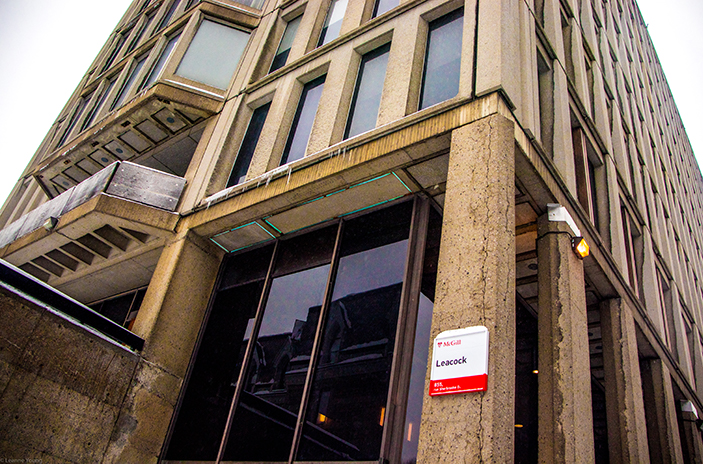Editor’s Note: A previous version of this article identified the authors as ‘second-generation students.’ Sanchez is a first-generation student. The authors regret this error.
Last March, we ran for and successfully secured the opportunity to serve as arts representatives to the Students’ Society of McGill University (SSMU). In this role, we are tasked with representing arts students at the SSMU level, sitting on Arts Undergraduate Society (AUS) and SSMU committees, and liaising between SSMU and the AUS Executive.
At AUS Legislative Council on Jan. 30, a motion was brought forward to approve ancillary course fees that would total $1000, including flights and accommodation, for a topics course (POLI 339) at the Hebrew University of Jerusalem. Under Quebec law, student unions approve additional course fees to ensure that universities do not overcharge students. The motion was voted down by one vote at the Legislative Council.
Following the results of the vote at Legislative Council, we were approached by a number of Arts students who were disappointed with the outcome of the vote; Jewish students were notably disappointed because of the historical and contemporary climate of anti-Semitism on campus. Former councillor Figueiredo also notified us of a petition signed by students who supported passing the course fee. In light of this response, the Executive team discussed re-vote options.
At an executive meeting on Feb. 6, Figueiredo also informed us of of by-law 2.2 which, along with the time constraint established by a professor in the department of Political Science, pushed our executive to make a decision ourselves. We were not aware of other additional clauses relating to our decision, such as Frais institutionnels obligatoires (FIO) 2.3, that would necessitate contacting the Political Science Student Association. Karia expressed her disagreement with the second vote taking place solely among the Executive and over Facebook as the procedure was undemocratic, and the medium not conducive to consultation with councillors. Sanchez suggested that abstentions not be allowed in order to ensure that all voices were represented.
During this process, debate arose regarding arts representatives’ ability to vote, and our suggestion to contact the Secretary General about the matter was ignored (p. 56), though other Executive members echoed our advocacy for a statement for transparency.
When the statement about the re-vote was released, both of us were on predetermined leave. Sanchez was away for health reasons, and Karia was away at a United Nations Commission. Both of our absences, which include online engagement, were deemed acceptable before the POLI 339 issue arose. In spite of this, Sanchez received a flurry of accusatory messages and notifications on her personal social media accounts and Karia was pressured into disclosing whether her health concerns were ‘valid.’ The morning following the vote’s release, Representative Sanchez was called a bitch by an individual unknown to her in the McLennan Library, and she had to to watch as someone stared at her with contempt while collecting signatures for our impeachment. We were both accosted and made to listen to accusations that we were whitewashed and selfish made by the same individuals claiming to care about executives receiving pressure or harassment.
We did not intend for our votes to serve as any given stance on the matter of Israel-Palestine relations. Accusations of racism are particularly harmful to the both of us on a personal level, as we are no more racist than the critics of POLI 339 are anti-semitic. As women of colour, we are not saying that we are impervious to making mistakes. What we are saying, is that we do not deserve to be personally targeted and harassed for participating in a vote that we not only contested, but share the responsibility for with the rest of our Executive. The only difference between ourselves and our team is our answer to the question “Do you approve of the course fee of $1000 for POLI 339 as referenced in the motion?”. Our votes were not, and should not be, mobilized in the context of debate outside of the particular context of an ancillary fee approval.
In our past and current involvements at McGill the both of us have worked tirelessly to uphold the rights of minority groups on campus. Representative Sanchez worked as Equity Commissioner in 2017, and her current work has improved family support and advocacy, health insurance for women and gender non-conforming individuals and a campus-wide survey on health care. Representative Karia is a Director on the Student Society’s Board and sits on its finance committee, being one of three women of colour to do so currently. She also works with the Francophone Affairs committee, supported the creation of the People of Colour Commissioner position, and has spearheaded an ongoing TVM project about representation in student government.
We sincerely hope that we may be able to continue in our positions, as throughout this all, we have in good faith dedicated ourselves to the best interests of AUS and its constituents. We are deeply sorry to those whom we have disappointed, whose oppression often works in tandem with other structural inequalities. Resigning would hinder our current efforts to prevent the occurrence of similar issues in the future, which include expanding travel and legal insurance at SSMU, ensuring that students on exchange receive adequate financial support, and proposing amendments to the FIO bylaws. If this issue is really about transparency, accountability, and intent, more of our critics would have taken us up on our offers for dialogue and immediate action, instead of silencing us and pressuring us to resign from our positions.
At the beginning of our term, people kept on telling us we were breaking a glass ceiling in student politics as first-generation (Sanchez), minority, female students. Now, it feels like we have been pushed off of a cliff instead.








